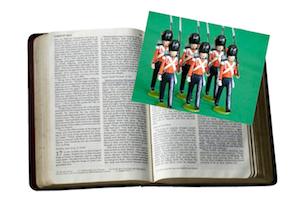 As the book of Exodus begins, the Israelites are in Egypt and quickly become slaves there. As I mentioned yesterday, it’s only logical to suppose that their oppressors disarmed them.
As the book of Exodus begins, the Israelites are in Egypt and quickly become slaves there. As I mentioned yesterday, it’s only logical to suppose that their oppressors disarmed them.
When they left Egypt, they had weapons, enough to fight against the Amalekites when attacked in Exodus 17. Best guess is that this was part of the spoils they took from the Egyptian people. In Exodus 32, the Levites were told that each man should strap a sword to his side to kill the Israelites who were worshiping the golden calf.
On the way to the Promised Land, the Israelites had to fight several battles. In Numbers 21, the Israelites were attacked by the king of Arad, either because he thought they were invading his land or merely because he saw a chance to plunder a virtually defenseless people. In retaliation, the Israelites “utterly destroyed” all of the cities in his kingdom.
Farther down in the same chapter, the Israelites request permission to pass through the Amorite nation ruled by Sihon. Sihon responded by attacking the Israelites. God’s people won the battle and took possession of the land of Sihon. The same thing happened with Og, king of Bashan.
These were the battles that weren’t actually part of the conquest of the Promised Land but were fought en route to the Promised Land. The slave nation was now able to defend itself. We’ll look next at what the Law has to say about war, before talking about the Conquest.

